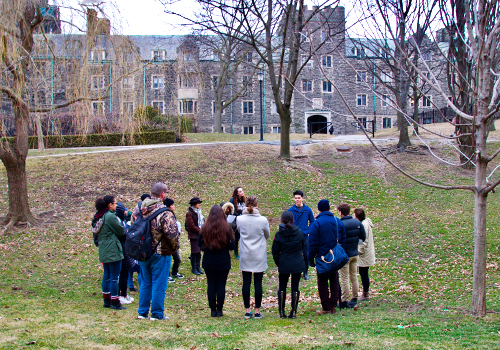For her achievements as an outstanding researcher, pioneering educator, and advocate for social and environmental justice, Andrea Most has received the prestigious Ludwik and Estelle Jus Memorial Human Rights Prize in the Influential Leader category.
The prize is one of the Awards of Excellence bestowed annually on faculty, staff and students by the U of T Alumni Association.
“I am thrilled that my work in the environmental humanities has been recognized by this prize,” says Most, a professor of English, American literature, environmental studies and Jewish studies in the Faculty of Arts & Science’s Department of English.
“In this time of existential crisis, my research and teaching aim to help students and communities connect with the earth that sustains them through story and ceremony, land-based encounters and embodied experiences. It is especially meaningful to me that in making this award, the University of Toronto highlights the close interconnection between human rights and the rights of all beings and, in honoring my work, also honors the web of life that makes it possible.”
Most is cross-appointed with the Anne Tanenbaum Centre for Jewish Studies, the School of the Environment, the Department for the Study of Religion, and the Centre for the Study of the United States at the Munk School of Global Affairs.
To win one Award of Excellence is an honour. To win two is remarkable. But it should come as no surprise, as Professor Most’s scholarly work, teaching accomplishments and activism are themselves remarkable achievements. I am thrilled to congratulate her on this distinction.
Her research spans environmental literature, Jewish studies, food studies and ecocritical theory. It focuses on food equity, land and environmental crisis, and diaspora and settler-Indigenous relations. In addition, her innovative pedagogy and experiential teaching engages students with diverse learning styles and earned her another Award of Excellence: the Northrop Frye Award in 2016.
According to the 2022 Awards of Excellence selection committee, “Most’s scholarship is a call to action: it urges us to find ways to repair our world and right our relationship with the land and its peoples.
“She epitomizes the ideal of scholarship in the service of a better and more just way of living. She empowers many U of T students to engage with the world beyond the University and effect change where they live, work, and study every day.”
“To win one Award of Excellence is an honour,” says Melanie Woodin, dean of the Faculty. “To win two is remarkable. But it should come as no surprise, as Professor Most’s scholarly work, teaching accomplishments and activism are themselves remarkable achievements. I am thrilled to congratulate her on this distinction.”

The award recognizes Most’s innovative and experiential teaching methods which she describes as challenging traditional notions of scholarship and public life, research and teaching, mind and body, nature and culture. For example, she has used outdoor land-based experiences and rituals to explore the Indigenous history of locations on the U of T campus; and she uses cooking to teach students about colonization and equity.
Most’s advocacy and activism is evident in her co-founding Bela Farm in Hillsburgh, Ontario, where farmers, environmentalists, artists and educators can gather to conduct experimental agriculture and engage in art, performance, education and environmental advocacy. Also, her research initiative, The Persephone Project, investigates the devastating impact of human-centric narratives of time on the Earth’s ecosystems and explores strategies for healing the damage.
In addition, Most is the author of two celebrated books. Theatrical Liberalism: Jews and Popular Entertainment in America was a finalist for a National Jewish Book Award; and Making Americans: Jews and the Broadway Musical won the MLA/Kurt Weill Prize for the best book in Music Theater.

